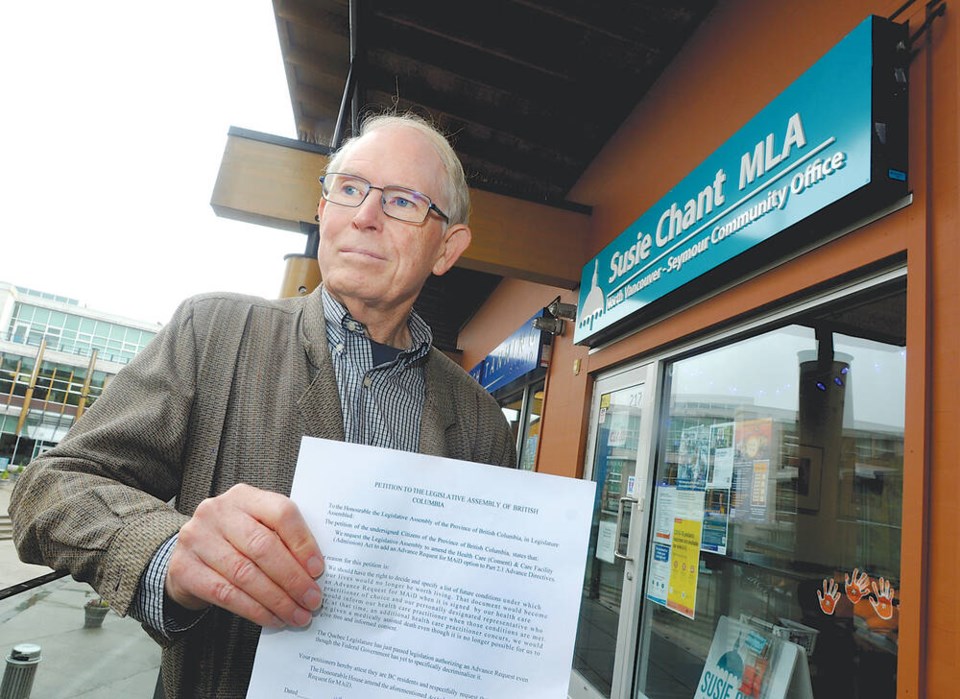R. David Stephens doesn’t want to turn into his mother. Or at least he doesn’t want to leave the world in the way she did.
The 78-year-old actor and activist has racked up more than 1,000 signatures and delivered to the B.C. Legislature a petition seeking to change the law and allow British Columbians to make an advanced request for medical assistance in dying, or MAID, in the event their health declines and life becomes intolerable.
MAID only became legal in Canada in 2016, a year after a Supreme Court of Canada ruling that the law governing assisted suicide was a violation of Canadians’ Charter rights. Since then, through the courts and Parliament, the law has evolved, gradually expanding who can be eligible. As of 2022, almost 45,000 people in Canada had received medical assistance in dying.
Dying with dignity campaign
What the law lacks though, Stephens said, is the ability for people to receive MAID if they are living through specified medical circumstances but have lost the capacity to request and legally be approved for it.
It’s something of a cruel catch-22 wherein the condition that causes someone's suffering also prevents them from receiving relief.
“People who have dementia or Alzheimer’s have no recourse whatsoever,” Stephens said.
That was the fate his mother met.
“She said, ‘Look, the last thing I want to have happen to me is to end up in a situation where I can’t talk and I can’t control my bodily functions, and I’m basically a vegetable and have to be warehoused in some healthcare facility,” he said. “She ended up exactly the way she didn’t want to… and I don’t think anybody should have to face that kind of an end-of-life experience.”
Although he had the support of the nationally focused Dying with Dignity campaign, Stephens went about collecting signatures the old-fashioned way – “buttonholing” people where they are and getting them to sign their names to a piece of paper. It was an arduous task, he said. Some people refused on religious principles, but the vast majority of those he approached were willing to sign.
Controversial calls
But the Canadian system for MAID is already subjects to critiques that it is too permissive, that it lacks safeguards against abuse, and that it is being turned to as an option for vulnerable people who could otherwise live a life with dignity if only they had more government support.
Stephens acknowledged the controversy and specified he is completely in favour of fixing the social safety net for people living through poverty and disability. But, he said, denying people MAID on that basis is an intrusion on their rights.
“I’m sorry, I don’t think that the social criticisms trump personal autonomy, by any means,” he said.
MAID for mental illness
In February, the federal government passed legislation to delay until 2027 the possibility of MAID for individuals whose sole underlying medical condition is mental illness.
Stephens chalks that up to cowardice on the part of the federal politicians who don’t want to have to deal with a difficult issue, but people continue to suffer needlessly, he said.
It’s wrong and unfair to them to presume that mental illness can or will soon be cured, he added, and it puts a heavy burden onto people who may not be able to bear it.
That was the case for a childhood friend of his who, last year, took his own life, in a very traumatizing fashion.
“Here’s a Harvard educated lawyer who had tried everything that the healthcare industry had to offer him in the States and he could find no relief. And to have to die that way or his family to have to find him that way, is just completely unconscionable,” he said, holding back to tears. “And I am so angry at the federal health minister for postponing this option for people.”
Ready for death
Eventually, the federal government will come around to the concept of advanced requests for MAID – or they will be forced to by the courts, Stephens predicted. And when that happens, he expects the provinces, which administer health care, to be ready with legislation already in place to allow people to make advanced requests. Quebec has already made the necessary changes, Stephens notes, and he hopes his petition will spur change here and elsewhere in Canada.
North Vancouver-Seymour NDP MLA Susie Chant tabled Stephens’ petition in the legislature on April 23. Because it is an election year, Stephens doesn’t expect his petition to make its way to the legislative agenda anytime soon, but for the sake of people suffering, he’s hoping it will arrive on the health minster’s desk sooner rather than later.
“By the time you do address these things, countless numbers of people are just going to fall by the wayside,” he said. “There are people who value quality of life over longevity… and everybody should have that option to make that decision for themselves.”



